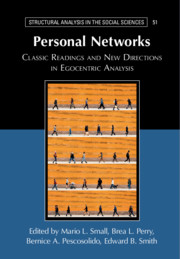Book contents
- Personal Networks
- Structural Analysis in the Social Sciences
- Personal Networks
- Copyright page
- Contents
- Figures
- Tables
- Contributors
- I Background
- II Early Foundations
- III Later Foundations
- 8 From Claude S. Fischer, To Dwell among Friends
- From the Northern California Community Study, 1977–1978, to the University of California, Berkeley, Social Networks Project, 2015–2020
- 9 From Mark S. Granovetter, “The Strength of Weak Ties”
- Strength of Weak Ties in the Labor Market: An Assessment of the State of Research
- 10 From Barry Wellman and Scot Wortley, “Different Strokes from Different Folks”
- A Network Pilgrim’s Progress: Twenty-Six Realizations in Fifty-Five Years
- 11 From James S. Coleman, “Social Capital in the Creation of Human Capital”
- Three Decades of Research into Social Capital: Achievements, Blind Spots, and Future Directions
- 12 From Bernice A. Pescosolido, “Beyond Rational Choice”
- Confronting How People Cope with Crisis: From the Social Organization Strategy Framework to the Network Episode Model to the Network Embedded Symbiome
- 13 From Scott L. Feld, “The Focused Organization of Social Ties”
- Reflections on “The Focused Organization of Social Ties” and its Implications for Bonding and Bridging
- 14 From Ronald S. Burt, Structural Holes
- Structural Holes Capstone, Cautions, and Enthusiasms
- 15 From Edward O. Laumann, Peter V. Marsden, and David Prensky, “The Boundary Specification Problem in Network Analysis”
- On the Boundary Specification Problem in Network Analysis: An Update and Extension to Personal Social Networks
- 16 From Miller McPherson, Lynn Smith-Lovin, and James M. Cook, “Birds of a Feather”
- The Enormous Flock of Homophily Researchers: Assessing and Promoting a Research Agenda
- 17 From Robert Huckfeldt and John Sprague, “Networks in Context”
- Individuals, Groups, and Networks: Implications for the Study and Practice of Democratic Politics
- 18 From Nan Lin, “Building a Network Theory of Social Capital”
- Social Capital: An Update
- 19 On the General Social Survey
- IV New Perspectives
- Index
- Recent Books in the Series
- References
17 - From Robert Huckfeldt and John Sprague, “Networks in Context”
from III - Later Foundations
Published online by Cambridge University Press: 01 October 2021
- Personal Networks
- Structural Analysis in the Social Sciences
- Personal Networks
- Copyright page
- Contents
- Figures
- Tables
- Contributors
- I Background
- II Early Foundations
- III Later Foundations
- 8 From Claude S. Fischer, To Dwell among Friends
- From the Northern California Community Study, 1977–1978, to the University of California, Berkeley, Social Networks Project, 2015–2020
- 9 From Mark S. Granovetter, “The Strength of Weak Ties”
- Strength of Weak Ties in the Labor Market: An Assessment of the State of Research
- 10 From Barry Wellman and Scot Wortley, “Different Strokes from Different Folks”
- A Network Pilgrim’s Progress: Twenty-Six Realizations in Fifty-Five Years
- 11 From James S. Coleman, “Social Capital in the Creation of Human Capital”
- Three Decades of Research into Social Capital: Achievements, Blind Spots, and Future Directions
- 12 From Bernice A. Pescosolido, “Beyond Rational Choice”
- Confronting How People Cope with Crisis: From the Social Organization Strategy Framework to the Network Episode Model to the Network Embedded Symbiome
- 13 From Scott L. Feld, “The Focused Organization of Social Ties”
- Reflections on “The Focused Organization of Social Ties” and its Implications for Bonding and Bridging
- 14 From Ronald S. Burt, Structural Holes
- Structural Holes Capstone, Cautions, and Enthusiasms
- 15 From Edward O. Laumann, Peter V. Marsden, and David Prensky, “The Boundary Specification Problem in Network Analysis”
- On the Boundary Specification Problem in Network Analysis: An Update and Extension to Personal Social Networks
- 16 From Miller McPherson, Lynn Smith-Lovin, and James M. Cook, “Birds of a Feather”
- The Enormous Flock of Homophily Researchers: Assessing and Promoting a Research Agenda
- 17 From Robert Huckfeldt and John Sprague, “Networks in Context”
- Individuals, Groups, and Networks: Implications for the Study and Practice of Democratic Politics
- 18 From Nan Lin, “Building a Network Theory of Social Capital”
- Social Capital: An Update
- 19 On the General Social Survey
- IV New Perspectives
- Index
- Recent Books in the Series
- References
Summary
Democratic politics is a collective enterprise, not simply because individual votes are counted to determine the winner of an election, but more fundamentally because the individual exercise of democratic citizenship is an interdependent undertaking. Citizens disagree, they argue with one another, they inform one another, and they arrive at political choices and decisions through processes of social interaction and deliberation.
Keywords
- Type
- Chapter
- Information
- Personal NetworksClassic Readings and New Directions in Egocentric Analysis, pp. 471 - 476Publisher: Cambridge University PressPrint publication year: 2021

